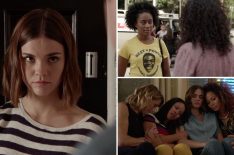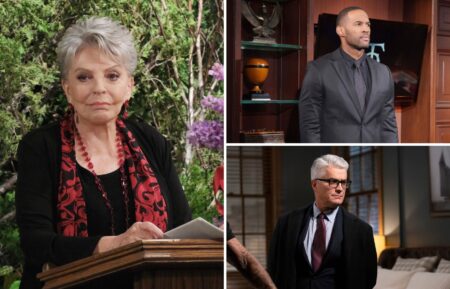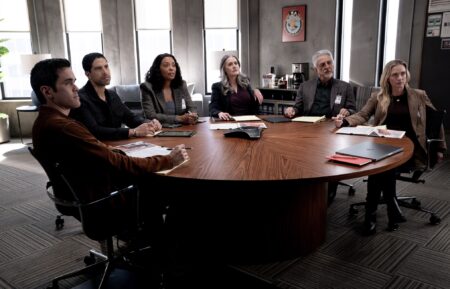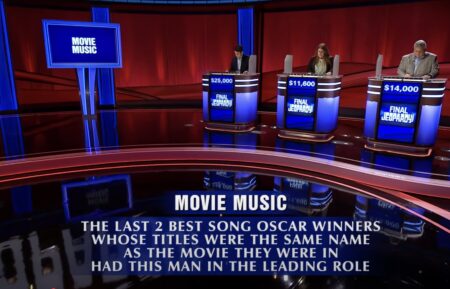‘Good Trouble’s Sherry Cola Teases What’s in Store for the Season 2A Finale
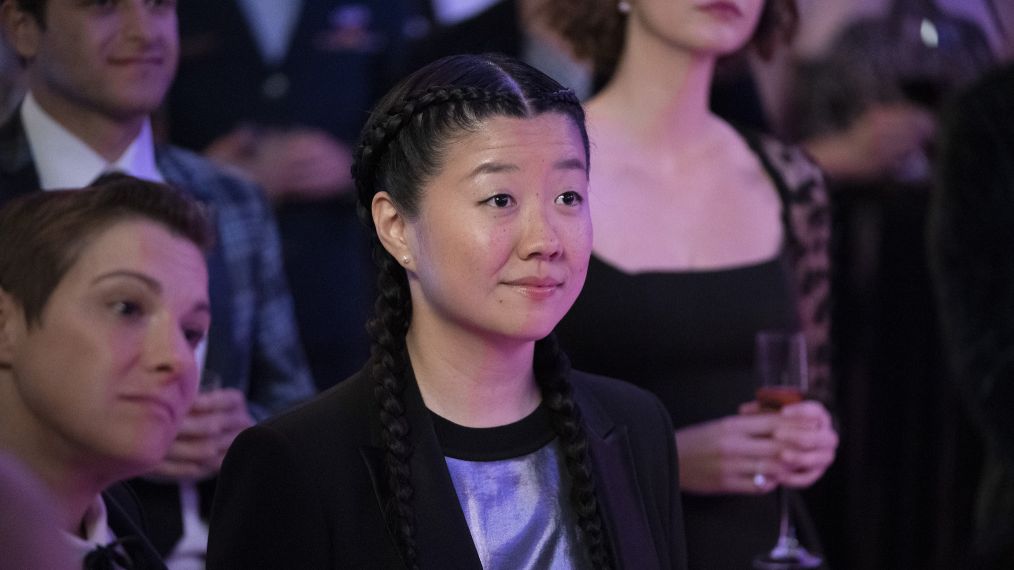
Q&A
Things are heating up on Good Trouble, and it’s all (maybe) going to come crashing down in the midseason finale!
Throughout the Freeform series’ second season, the Coterie crew has faced everything from shifting dynamics between sisters Callie (Maia Mitchell) and Mariana (Cierra Ramirez) to romantic struggles for friends Davia (Emma Hunton) and Dennis (Josh Pence) to new personal and professional territory for proprietor Alice.
TV Insider had the chance to speak with Sherry Cola, who brings the always-lovable Alice to life, about her character’s first-time journey into the stand-up comedy world, what’s at stake in her new relationship, and how she’s changed since coming out to her parents in Season 1.
How do you think your character has grown over this season, heading into the Season 2A finale?
Sherry Cola: I think, confidence-wise, we saw her do a sexy dance, we saw her struggle with the idea of sexiness and kind of find what that definition is for her, and I guess onstage being able to express through comedy. In Season 1 she was always joking around, bottled her emotions, and now she’s found this outlet that literally is a platform for getting stuff off your chest. It’s interesting. I love the [stand-up] world that she’s been exposed to. She’s meeting people outside of the Coterie and the drama that is attached to that. So I think it’s exciting just for her to be in a new atmosphere with a lot of things that challenge her. It’s definitely the beginning; we’re not even close to her fully discovering herself.
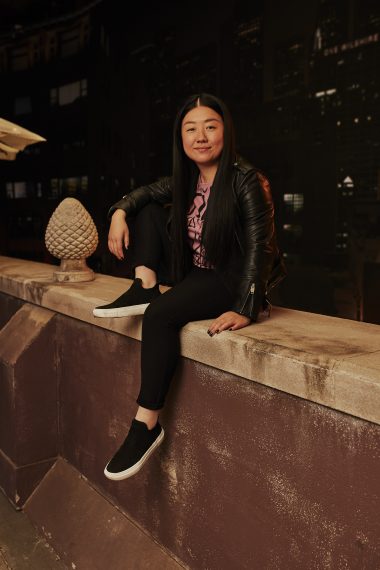
Freeform
You yourself are a stand-up comedian. How did it feel getting to perform standup comedy as Alice within the series?
Although I’ve been doing standup as Sherry Cola in my real life for a little over three years, which isn’t long at all, it is interesting purposefully acting and doing stand-up awkwardly. It’s very interesting, because Alice obviously has barely picked up a microphone… and it’s adorable. And she’s really trying to put herself out there, and she’s been locked up in this space [in the Coterie] for so long. She had Sumi, her ex-girlfriend, they were basically secretly lesbians together, [but] now there’s that liberation of her out of the closet and now she can talk about it onstage. That’s a whole new world. I think for her to find her voice, it’s very interesting. And me, I’m still finding my voice as Sherry Cola, and that’s just part of the journey.
Did you have any input in adding that character development for Alice?
That was already part of the character description before I even went in for the audition, so they already had a plan for Alice to be an aspiring comedian. That was really cool; the stars just kind of aligned. It does reflect my real life a little bit, but it’s been very fun doing standup as Alice and being silly and kind of experimenting. And, of course, the showrunner Joanna [Johnson] — who I’m in love with [and] she’s a queen — she checked in with me when they were about to start this storyline. She didn’t want to step on my toes or anything or let it kind of melt too closely into my reality. But I was super excited about it, because at the end of the day, truly, Alice and Sherry Cola are very different people. The writers are amazing; they very much value my input and my two-cents and they let me play.
You already mentioned Alice doing stand-up as part of building her confidence. But tell us more about that sexy dance that she did in Episode 6?
With the sexy dance, that was inspired by Ashly Perez, one of our writers who used to be at BuzzFeed, and she did this video where she learned to be sexy in 30 days and learned a dance. And I really related to this whole idea. Of course, once again, the whole writers’ room, EPs, they’re so amazing in checking in if we’re OK with it, like ‘Are you down to do a sexy dance?’ Because, as Sherry Cola, like “sexy” is such a weird word. It’s this adjective that makes me cringe a little bit, and I never really see myself as sexy. I’m adorable, sure. I’ve really been gambling on personality, sure. But when it comes to doing a sexy dance, that was the biggest challenge yet, and I was game. Whoever’s watching can find confidence in other ways and [see] how the definition of sexy shouldn’t be limited to fishnets.
Do you think we’re going to see more moments of Alice gaining confidence throughout the series?
Totally. I mean, I hope that we see more of this stand-up world and we meet more people and we get more twists and turns that way. It’s going to be very interesting to see her one day be good at stand-up. I don’t know what this world can open up to, you know. I can’t even wrap my head around it because right now we’re not even close, because it’s not overnight. We have to be real about it, and one thing Good Trouble is, is real. So she’s not about to get her hour special — it’s been like three episodes. I feel like maybe more drama and intertwining the worlds in the stand-up community? There’s no limit to who Alice can meet in the outside world, so it’s exciting. It’s really exciting.
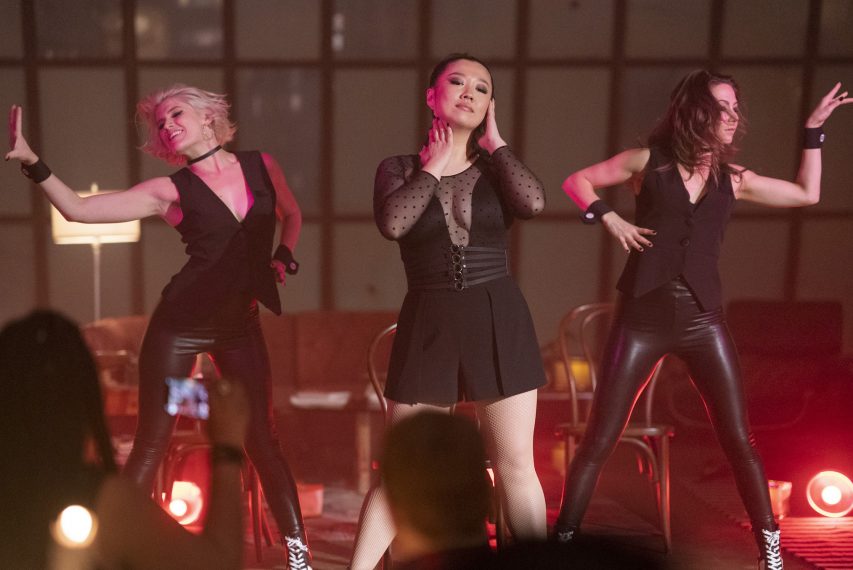
(Freeform/Christopher Willard)
Alice had one of the most emotional endings of the first season when she came out to her parents. In terms of tone and plot, what can fans expect for the midseason finale?
That was a really heavy ending and sort of surprising. We underestimated Alice’s parents. We thought they would hang up the phone, but they were actually accepting and that kind of provided this light at the end of the tunnel, kind of like ‘Hey, if you just express yourself and live your truth then it can feel really liberating.’ Of course, it’s not always the case. A lot of coming out stories are painful, and they can end in hurt and even the stopping of communication. I mean, it can be really bad. But I feel like Alice’s story kind of shows that there’s a light at the end of the tunnel, especially with immigrant parents and that kind of stereotype, if you will, around how Asian communities or just immigrant families are so not accepting. This shows that, hey, maybe they can be accepting.
And this is another reason why there should be more stories like this on the TV screen. I didn’t see this when I was growing up and that kind of perpetuated the stereotype. But now if we keep showing stuff like this, hopefully Asian parents everywhere, immigrant parents everywhere, close-minded parents everywhere can actually change their perspective. It was really a cool scene to do, because my background is in comedy and I’m really grateful to Good Trouble for opening up that dramatic side. I’m over here shedding tears! I never thought that I would be in this position. I’m incredibly grateful [and] I want to keep doing it.
But in terms of the Season 2A finale, obviously there’s a bit of a love triangle situation with Alice. Alice is kind of in a like/love triangle because she’s with Joey [Daisy Eagan], and she meets Lindsay [Rhea Butcher], who she’s a fan of, and it’s kind of a crush career-wise. It’s someone Alice looks up to and is intrigued by and obviously wants to hang with because Lindsay Brady is an OG in the comedy game. So I feel like with Joey hesitant with that whole kind of situation, and apparently Lindsay has history with Joey… it’s really complicated. Alice is just constantly met with dilemmas. As much as she wants to respect her relationship with Joey, she also wants to explore this friendship with Lindsay. So you’ll get to see more of that for sure in the Season 2A finale, and it’s just going to shake things up without a doubt.
What do you think Alice’s relationship with Joey has done for her identity and understanding of herself?
I think Joey definitely challenges Alice. Even with the whole conversation right before Alice came out, Joey brought up some good points, if you will, that kind of influenced Alice to tell her parents. I feel like with every episode, Joey is very supportive, and Joey always keeps it real. Joey, even with the sexy [dance] thing, is breaking Alice out of her shell and challenging her and helping her discover new things about herself, which is cool.
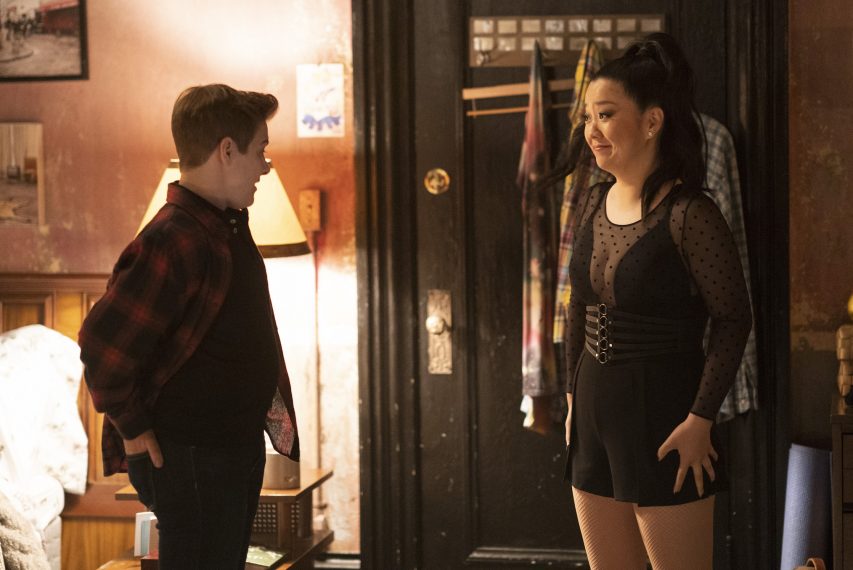
(Freeform/Christopher Willard)
How do you think Alice has changed since that moment in Season 1 when she came out to her parents?
I think obviously her parents are still very much like ‘Don’t tell the rest of the family.’ Alice is still hesitant on telling her parents about Joey being non-binary. Because it’s like, ‘OK baby steps. They just got used to me liking women.’ It’s very hard as kids to just tell our parents a lot at once. You want to tell them bad news or good news or whatever in increments. I really can’t speak for anyone or everyone, but for me specifically being in my Asian-American immigrant family dynamic, I can’t just drop bombs on my parents. There’s already a language barrier, number one. There’s already a lot of things that my mom isn’t exposed to, like even what the acronym LGBTQ stands for, which I had to teach her after I started portraying Alice.
So it really is a baby steps type of thing, which is why Alice is so relatable and the way she deals with her parents, it is on-point. Even in last season with the scene with Sumi and her parents at lunch, with the Mandarin — it just really means a lot that the writers cherish that aspect and really want to tell the story correctly. So I’m excited for more things with my parents, more opening their point of view, and more of their journey of acceptance for sure. Maybe the parents will come to a stand-up comedy show?
And if Alice continues to pursue comedy, will her role in the Coterie change?
I definitely think Alice is still going to run the Coterie, still manage it, because obviously stand-up comedy isn’t going to pay the bills — I know that all too well. So she’s definitely still going to do that, she’s 100 percent still going to be at the Coterie — the Coterie forever. But she’s going to be juggling for sure. And I’m excited for everyone to see [Season] 2B! I’m telling you, the twists and turns are coming through.
Good Trouble, Season 2A Finale, Tuesday, August 6, 8/7c, Freeform


